A bill moving in the Pennsylvania Senate would allow the state to collect and archive DNA samples from people when they are arrested, even if they are never convicted of a crime — a proposal that has generated pushback from both ends of the political spectrum.
The Senate Judiciary Committee on Tuesday voted to advance a bill that would expand Pennsylvania’s DNA collection law, which currently allows law enforcement to collect samples and enter them into a database when a person is convicted of certain crimes.
The bill, sponsored by Sen. Frank Farry, R-Bucks County, would expand this to permit collection when a person is arrested or charged — significantly increasing the number of DNA profiles in the system used by investigators to search for matches with DNA taken from crime scenes.
Farry’s bill would also close a loophole in the existing law, which currently doesn’t mandate those convicted of criminal homicide to provide a DNA sample. The current DNA gathering law applies to sex offenses and violent crimes, as well as some minor infractions such as writing bad checks.
An amendment added to the bill during Tuesday’s meeting further expands the law’s definitions to require DNA samples from those accused of “attempt, conspiracy, or solicitation” of any of the qualifying crimes.
“This tool works in a couple different ways,” Farry said. “One, it will hopefully lead to the arrest of individuals who commit some of these very violent and heinous crimes through a DNA match. But it can also exonerate people and rule out suspects.”
Farry pointed to a case in Bucks County where a woman’s rapist was caught after his DNA was collected and put in a database in California; similarly, Farry said, DNA matching was used to rule out suspects in a recent robbery.
“This has been found to be constitutional for over a decade,” Farry said, referencing the 2013 U.S. Supreme Court decision in Maryland v. King. “To do a DNA swab during time of arrest for certain offenses — certain serious offenses — is constitutional, no different than fingerprinting or taking a photograph.”
But that precedent doesn’t sit well with lawmakers at either end of the ideological spectrum. Farry’s bill passed out of committee on an 8-to-6 vote, opposed by every Democrat and Sen. Cris Dush, R-Jefferson County, one of the body’s most hardline conservatives.
“I would be supportive of expanding the law to have DNA taken at arrest for truly violent crimes,” said Sen. Steve Santarsiero, D-Bucks, the committee’s ranking Democrat.
But the bill is far more expansive than that, and the amendment in particular “broadened the scope of the bill to include inchoate crimes like attempt and conspiracy,” Santarsiero said, concluding that “I have concerns about the scope of the bill as currently written.”
The King case was decided by the Supreme Court along the same ideological divide seen among state legislators Tuesday, with the court’s three most progressive justices joining a dissent by Justice Antonin Scalia, a staunch conservative.
In his remarks Tuesday, Dush read directly from Scalia’s opinion, in which the justice disputed the idea put forth by his colleagues that DNA collection was a matter of routine identification allowable under the Fourth Amendment, which protects Americans from unreasonable search and seizure.
“Make no mistake about it: as an entirely predictable consequence of today’s decision, your DNA can be taken and entered into a national DNA database if you are ever arrested, rightly or wrongly, and for whatever reason,” Scalia wrote in a passage cited by Dush.
While such databases may result in more crimes being solved, Scalia wrote in his dissent, so would taking DNA samples from anyone who boards a plane or applies for a driver’s license. The dividing line is probable cause, the justice argued, and the government does not have this when it comes querying the DNA of thousands of people for crimes that there is otherwise no suspicion of them being involved in.”
The Pennsylvania chapter of the American Civil Liberties Union has voiced similar reservations about Farry’s bill, particularly since the state constitution contains protections that can be read as even more stringent than the Fourth Amendment.
If enacted, the bill “would permit the government to use a single arrest as blanket ‘probable cause’ to investigate the arrestee for a multitude of other crimes, past and future, without any showing of individualized suspicion,” the ACLU wrote in a memo to lawmakers.
Such a legal position, the ACLU wrote, “turns the presumption of innocence on its head by making individuals who haven’t been convicted of any crimes into permanent suspects.”
In response to Dush’s critique, committee chair Sen. Lisa Baker, R-Luzerne County, said she would be open to adding language to the bill for automatic expungement of DNA records for individuals who were arrested but not convicted, or had charges dropped.
Farry’s bill now heads to the full Senate for further consideration.








